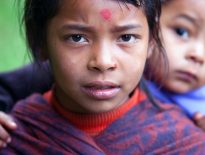One of the small joys of my childhood was to visit my maternal grandmother at the house on the hill.
She lived in one of the most picturesque areas of our country, Maramureș, on a hill overlooking the Maramureș Mountains, where the fog kissed the ground on summer days and the endless white made time stand still in winter.
Whenever I climbed the hills to reach my Nana, I felt like I was going to a place where goodness knows no bounds. The feeling of pure goodness used to be the roasted peanuts waiting for me on the stove, my favourite pie, my hair being stroked as I fell asleep, or rough hands kneading restlessly. It used to be, because it no longer is, but it is precisely because it used to be…
My Nana and goodness were and are synonymous to me. Looking back, I understand that places give birth to stories—but more than places, stories are birthed by the people who give themselves to God and to others. They don’t get poorer, because the broken bread in them is us, the ones who feed on what they put in us and carry the story forward…
What is the context that makes goodness a social act?
“It is not good for the man to be alone” is one of the first observations in the pages of the Bible (Genesis 2:18). We are born wanting to be at our mother’s breast, we grow up wanting to be with our friends, we have our own family and we want it to be our little heaven so that in our old age we can still be with our little tribe.
Humans were created to be social beings, but individualism and the fragmentation of everyday life have increasingly undermined this desire. We feel that are better off alone, but the Bible says: “Two are better than one” (Ecclesiastes 4:9); it is easier for us to keep to ourselves, but wisdom says: “It is more blessed to give than to receive” (Acts 20:35). What, then, are the sources of our being that can restore the invisible bonds between us and others?
Returning to the time when we learned to become social beings—that is, when we communicated with others and gave of ourselves for altruistic purposes, not just for the sake of expressiveness and the creation of a persona, but because we knew it was the right thing to do—is the context in which we might understand that kindness is by definition a social act. We only know that we are good when we do good to our fellow human beings, when we seek their presence, and when we fulfil their needs. And most of the time we don’t know it—like a grandmother who greets her grandchildren with roasted peanuts on the stove. She doesn’t think of herself as good; she becomes good in relation to her grandchildren. The peanuts and the stove, even the grandmother, would be just passive tools without the social act called kindness.
How do we learn to be good, and when do we become good?
The development of social skills begins in the early years of life. A child’s harmonious development takes into account his or her social, emotional, and cognitive skills, which form the basis of later adult social engagement. The process begins in childhood and continues into adolescence, during which communicative and relational tools are developed with the aim of establishing positive social relationships that are sources of satisfaction and contentment.
Although the literature still sees social intelligence as an integrative concept that is difficult to define, there is a dynamic in the child’s life that predicts later moral and ethical choices. Social engagement, joyful giving, and finding a balance between life for oneself and life for others are not accidents or miracles. They put our being to the test and give us the ability to see life with new eyes. They are the great revelations that good people have.
We know, then, that the social commitment of children requires a twofold perspective. One is self-orientation. Principles such as: “Love your neighbour as yourself” (Matthew 19:19) or: “Do to others as you would have them do to you” (Matthew 7:12) cannot make sense if a child does not know how to build him or herself up as a person. This self-love is too often associated with selfishness, when in fact it can mean deep self-knowledge, control of emotions and behaviour, and knowledge of one’s passions and of how the world works through a process of introspection and self-reflection. When children learn to be reflective, their relationship with the outside world will be well calibrated.
The other direction is in relation to others as a result of their own beliefs about themselves and the world. We can’t ask children to demonstrate relational skills all at once without introducing them to the world of empathy, of talking about kindness, about giving, about the meaning of life. Empathy leads to sympathy.
The harmonious development of a child’s social engagement requires a holistic approach that enables them to understand and appreciate the joy of giving. By learning about giving, setting boundaries and practising willing participation, we can help children to develop genuine social involvement and contribute to the wellbeing of others and themselves. This process requires a supportive learning environment and appropriate role models.
What should parents know about children’s social development?
- The power of example. Social skills are acquired through observation or imitation of behaviour, information gathering, trial and error cycles, etc. Do what you want to see your children do!
- The role of contexts. Place your children in contexts where social engagement is valued—their peers will either emphasise this or, on the contrary, feed their lack of interest.
- Play and relationship skills. Play is based on a social contract—I play nicely, follow the rules and react appropriately to the outcome in order to be accepted by others and to have friends. It’s also the game of life when it comes to relationships.
- The boundaries of giving. The joy of giving comes from maintaining a balance between one’s own needs and those of others. Maintaining one’s dignity and accepting that we can’t feed all the needy people we meet on a given day will help children understand that every day has a purpose. Today I feed a person, tomorrow I plant a tree. Giving is about building the self beautifully, not burying it in the guilt of having. I have so that I can bless. I am blessed so that I can give.
- Social tact. In the various contexts of life, children need to understand what it means to be a good citizen of the world—differences of race, gender, class or financial stability do not place us above others. Cultivating social tact entails the ability to communicate in different contexts in a way that does not harm people or undermine their dignity.
- Problem solving. Disputes between siblings, schoolmates or neighbourhood friends can be the right occasions to understand that problems are opportunities to offer understanding and empathy and to try to find the common good without compromising personal principles.
- Character. The purpose of a charitable act or the way one reacts to a social event shows the character of the person—which is the sum of his or her values.
- Mental and emotional balance. By working for the good of others, children will calibrate themselves in relation to others, feeling satisfied and fulfilled. Furthermore, the example of our Creator is a clear illustration of the laws of the universe: “For God so loved the world that he gave his one and only Son, that whoever believes in him shall not perish but have eternal life” (John 3:16).
- Relationships with others. A happy child will always have or be a close friend. Early friendships put us in relation to the world around us, showing us that there are invisible connections between us.
- The meaning of life. From an early age, children ask questions such as, Who am I? Where do I come from? Where am I going? The thought of eternity is in us (Ecclesiastes 3:11). Even the little ones know this. Explaining one’s place in the world and in God’s universe to a child implies social accountability, a desire to wish others well and to grow up gracefully for the world beyond—a world in which the Godhead is a Trinity, a social unity built on love and mutual giving.
Social skills refer to a broad group of abilities that enable us to interact and communicate with others. Cognitive elements, the environment, and the behaviour of others help children to develop a sense of the world. They will give to the world what they have learned, seen and felt. A harmonious worldview will lead to positive developmental outcomes, including peer acceptance, academic achievement, and mental health.
Social skills, or their lack, can play a role in the emergence of internalising and externalising problems, emerging as protective and risk factors. The absence or inappropriate use of these skills can lead to the formation of false views of reality. A better place for our children starts with the contribution they see us making—it’s the reality they see us building.
Crina Poenariu is a wife and mother of two children, a doctor of philology and a doctoral candidate in educational sciences, as well as a broadcaster for Hope TV Romania and Voice of Hope Radio Station Romania. Together with her husband, she has been coordinating the Transylvania International School educational project for the past five years and, more recently, a distance-learning school in the USA.



















